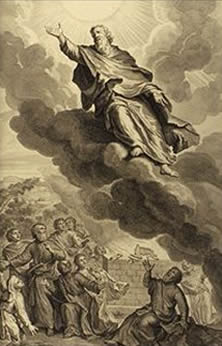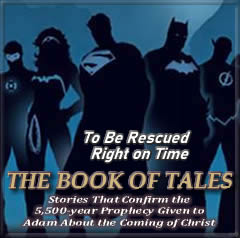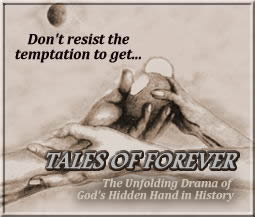Enoch: as The Go-Between (Cont’d)
Parallels of Thought
In the Gospels of both Matthew and Luke, for example—when Jesus spoke of the resurrection of the dead, where people will refrain from marriage because they will be like the angels of Heaven—it turns out that He was actually quoting Enoch.1 “But from the beginning you (speaking of the angels) were made spiritual, living a life that is eternal; therefore, I (God) have not made wives for you because your dwelling place is in Heaven.”2
Elsewhere, John has Jesus speaking of “rooms” in Heaven.3 But what most people never realize is that before Jesus mentioned them Enoch spoke of the “habitations of the elect.”4 Speaking to his children, Enoch said, “In the great time to come, there are innumerable mansions prepared for men—good ones for the good, and bad ones for the bad.”5 Later, Paul would echo this same idea when he wrote: “If the earthly tent we live in is destroyed, we have a building from God, an eternal house in Heaven, not built by human hands.”6
Furthermore, one of the titles Jesus gave Himself to convey His unique role in history, that of the Son of Man—repeated eighty-one times in The Gospels—finds its source in none other than Enoch. Mark has Jesus saying, “At that time, mankind will see the Son of Man coming in clouds with great power and glory, and He will send His angels to gather his elect from the four winds, from the ends of the Earth to the ends of the Heavens.”7 In this passage, one can see that Jesus was referring to First Enoch, when the patriarch prophesied that:
The kings, princes, and all who possess the Earth will glorify the Son of Man, Who was concealed from the beginning, in complete secrecy, by the power of the Most High and revealed only to the elect. He will sow the congregation of the saints and the elect, and they will stand before Him on that day.8
Story Continues Below
Says Richard Price—the founder and CEO of Academia.edu—on his podcast In Depth With Academia:
The Book of Days: In Search of the 5,500-year Prophecy Given to Adam About the Coming of Christ is:
To hear Price’s book review of The Book of Days, CLICK HERE.
To hear Kent talk about the little-known biblical prophecy, which speaks of the 5,500-year chronology from Adam to Christ, with Zen Garcia, the host of the Internet talk show Secrets Revealed, CLICK BELOW.
Story Continues From Above
Another remarkable evidence for the authenticity of First Enoch is revealed when one considers the disciple’s description of the transfiguration of Christ: “And a voice came out of the cloud, saying, ‘This is My Beloved Son: Hear Him.’”9 Matthew, Mark, and Luke all record this same event, each describing the scene in similar terms—with one exception, however. Luke, in his description, provides a unique distinction that was sadly omitted by the King James Bible translators, an omission that obscures the true meaning of Luke’s rendition, which was clearly spelled out in the original Greek. Fortunately for us, later generations of translators who had access to the Greek manuscripts were not so worried with the Elizabethan concern for textual uniformity, and have admirably noted Luke’s subtle but all-important distinction. According to The Expanded Bible, in Luke’s recounting, we discover what the voice out of the cloud really said. “This is My Son, My Chosen One: Listen to Him.”10
In this version, the translators compare this exalted title to one that is found in the forty-second chapter of The Book of Isaiah. Most render Isaiah’s description as: “Behold, My Servant Whom I uphold, My Chosen, in Whom My soul delights.”11
Clearly, one can see the parallels in the language of Isaiah with that of Luke’s, when he records the circumstances of the transfiguration event. Of greater importance still is that Isaiah’s title of “My Chosen ” is often rendered as “My Elect.” Sources for this variation include the esteemed Geneva Bible, a translation that predated the King James Version by more than half a century, and one that accompanied the Pilgrims on the Mayflower. The reason that this distinction is so important is because the title of the “Elect One” is found fifteen times in First Enoch.
In that day, the Elect One will sit upon a throne of glory, and their spirits within them shall be strengthened when they look upon My Elect One, because they’ve fled for protection to My holy and glorious Name. In that day, I’ll cause my Elect One to dwell in their midst.12
Assuming, then, that this book was known to the disciples of Christ, one can only imagine their considerable astonishment when the “voice out of the cloud” told them concerning Jesus that “This is My Son, My Elect One,” the very One Who was promised in The First Book of Enoch.
Could it actually be possible that such precise parallels of thought are the result of books that were not divinely inspired? Furthermore, who in their right mind would even concern themselves with the hackneyed controversy of who did or did not write these books when they have been linked with the teachings of none other than Jesus, Isaiah, Matthew, Mark, Luke, John, and Paul? Clearly, this book—and others just like it—have been treated as genuine sources of truth by some of the greatest seers in the history of the world, and just because a bunch of well-intentioned “experts” have cast these books into the realm of doubt and suspicion does not mean that free-thinking, rational minds should henceforth be kept from coming to their own conclusions.
So away with the outmoded verdict of self-appointed geniuses, who, in their timid ignorance, refuse to sanction the books of such luminaries as Enoch, who, as the canonical record clearly states, walked and talked with God. Let the light of truth shine forth as it has always been meant to do, and let no one presume to hold back what God has intended by way of the revelation of Jesus Christ, the Elect One Who “dwelled in their midst,”13 the Son of Man Who, though once “concealed by the power of the Most High,”14 has now “chosen to reveal the secret of God’s kingdom to His saints and His elect.”15








